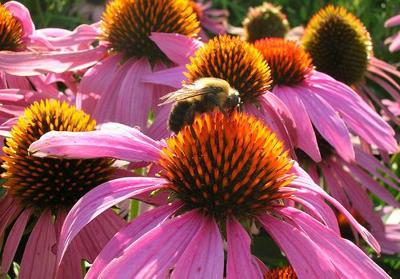Unless you have been living under a rock, you should be aware by now of the importance of bees (and insects in general for that matter) on our ecosystem. They are our chief pollinators, along with wasps and flies, some moths and butterflies, and even hummingbirds and bats. In the early season, one can observe our native mason bees and bumble bees working over early blooming shrubs, bulbs and perennial and later in the year, the honey bees are the dominate species in the garden. There are several things that home gardeners can do to encourage bees and other insects to come into their yard. Here are some things to consider.
First and foremost, the more diverse our landscapes are, the greater the odds are that we will lure insects into the garden. It goes without saying that the vast majority of bugs are beneficial, not to mention that they are a source of food for the birds. Unless you are highly allergic to bee stings, you should not be concerned with a few insects marauding about the garden and having something in bloom year ‘round is the easiest way to make sure they will come visit. The way to accomplish this is to simply visit the garden center once a month and buy something that is in bloom. It could be a shrub, tree, perennial, or annual — it really doesn’t matter to the bugs — take it home and arrange it in a logical and aesthetically pleasing manner within your landscape. In a few short years, you will have a lovely garden that will bring both you and the bugs many happy hours of enjoyment.
If you are running out of room for trees and shrubs, consider the following… Recently I read an article about “Bee Lawns," which is a relatively new craze where you take a boring grass lawn and convert it into a meadow of multiple species of flowering ground covers — like clover, self-heal and creeping thyme. Depending on the seed mix, you could be mowing your lawn anywhere from as little as 3 to 4 times a year to possibly even only once, the whole time drawing in pollinators from all around the neighborhood. This is an intriguing concept that our own Washington State Department of Agriculture is working on and we should see more information available about it later in the year.
“Insect hotels” are a fad that I observed starting at least 10 years ago while touring in Germany. In many of the public gardens I saw these strange structures that were filled with tubes, cones, bark and general yard debris — all arranged in an artful manner and housed in a dollhouse-like structure. Not only were they interesting to look at, they were a magnet for attracting bugs. Fast forward 10 years and now gardeners can purchase smaller versions of these “hotels” at their local garden centers, take them home and simply mount them on an east facing wall, where the morning sun will warm them up. If you have kids, this is a great way to introduce them to the world of insects.
Finally, on to Mason bees. They are native, solitary and rarely sting, making them easy for home gardeners to incorporate into their gardens. You can purchase mason bee cocoons from your local garden center this month and start to get them established in your yard. Adding a mason bee house will make it easier for them to take up residence in your yard and before you know it, you will be the “bees knees” for these little guys.
Becoming a “pollinator gardener” can not only be lots of fun, but it can be hugely beneficial and necessary for the pollination of our fruits and veggies. Consider becoming part of the solution to the declining populations of bees by taking some of these relatively easy steps — you will be glad you did.
Steve Smith is the owner of Sunnyside Nursery in Marysville and can be reached at [email protected].


(0) comments
Welcome to the discussion.
Log In
Keep it Clean. Please avoid obscene, vulgar, lewd, racist or sexually-oriented language.
PLEASE TURN OFF YOUR CAPS LOCK.
Don't Threaten. Threats of harming another person will not be tolerated.
Be Truthful. Don't knowingly lie about anyone or anything.
Be Nice. No racism, sexism or any sort of -ism that is degrading to another person.
Be Proactive. Use the 'Report' link on each comment to let us know of abusive posts.
Share with Us. We'd love to hear eyewitness accounts, the history behind an article.